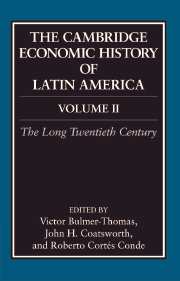Bibliographical Essays
Published online by Cambridge University Press: 28 March 2008
Summary
LUIS BÉRTOLA AND JEFFREY G. WILLIAMSON
If not a new concept, globalization is a relatively new word. In a narrow sense, not much was written about globalization in Latin America prior to 1940. Since then, the historical literature on globalization has boomed. Furthermore, Latin American economic history, and work on the Latin American globalization experience in particular, have undergone two major shifts, both in the last two decades. The first shift has been manifested by a diminished role played by Latin American scholars in the production of comparative and general economic histories, and an augmented role by Anglophone scholars and editors directing big projects. The second shift entailed a move away from dependency and developmental or structuralist approaches toward mainstream economic theory (the new economic history), the new institutional economics, and the new political economy. In some cases, this new trend implied a revisionist attempt to show the achievements of export-led growth. In others, the work looked to domestic factors in order to explain why the benefits of globalization were not adequately exploited. Still others incorporated the contributions made by dependency and structuralist thinking and the new approaches in assessing the evolution of the domestic economy.
- Type
- Chapter
- Information
- The Cambridge Economic History of Latin America , pp. 647 - 728Publisher: Cambridge University PressPrint publication year: 2006



